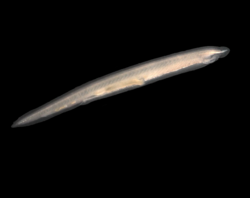Difference between revisions of "Cephalochordata" - New World Encyclopedia
Rick Swarts (talk | contribs) (Added article form Wikipedia and credit and category tags) |
Rick Swarts (talk | contribs) (revised taxobox) |
||
| Line 1: | Line 1: | ||
| − | {{ | + | {{Taxobox_begin | color = pink | name = Lancelets}} |
| − | | color = pink | + | {{Taxobox_image | image = [[Image:Branchiostoma_lanceolatum.png|250px]] | caption = Lancelet (''Branchiostoma lanceolatum'')}} |
| − | | name = Lancelets | + | {{Taxobox_begin_placement | color = pink}} |
| − | | image = Branchiostoma_lanceolatum.png | + | {{Taxobox_regnum_entry | taxon = [[Animal]]ia}} |
| − | | | + | {{Taxobox_phylum_entry | taxon = [[Chordata]]}} |
| − | | | + | {{Taxobox_subphylum_entry | taxon = '''Cephalochordata''' }}<br/>{{Taxobox authority | author = [[Richard Owen|Owen]]* | date = 1846}} |
| − | | | + | {{Taxobox_end_placement}} |
| − | | | + | {{Taxobox_section_subdivision | color = pink | plural_taxon = Families}} |
| − | | | + | Asymmetronidae<br> |
| − | | | + | Branchiostomidae |
| − | | | + | {{Taxobox_end}} |
| − | | | ||
| − | |||
| − | |||
| − | |||
| − | }} | ||
The '''lancelets''' (subphylum '''Cephalochordata''', traditionally known as '''amphioxus''') are a group of primitive [[chordates]]. They are usually found buried in sand in shallow parts of temperate or tropical seas. In Asia, they are harvested commercially for food that is eaten by both humans and domesticated animals. They are an important object of study in zoology as they provide indications about the origins of the [[vertebrate]]s. | The '''lancelets''' (subphylum '''Cephalochordata''', traditionally known as '''amphioxus''') are a group of primitive [[chordates]]. They are usually found buried in sand in shallow parts of temperate or tropical seas. In Asia, they are harvested commercially for food that is eaten by both humans and domesticated animals. They are an important object of study in zoology as they provide indications about the origins of the [[vertebrate]]s. | ||
Revision as of 02:14, 13 December 2006
| Lancelets | ||||||
|---|---|---|---|---|---|---|
 Lancelet (Branchiostoma lanceolatum) | ||||||
| Scientific classification | ||||||
| ||||||
| Families | ||||||
|
Asymmetronidae |
The lancelets (subphylum Cephalochordata, traditionally known as amphioxus) are a group of primitive chordates. They are usually found buried in sand in shallow parts of temperate or tropical seas. In Asia, they are harvested commercially for food that is eaten by both humans and domesticated animals. They are an important object of study in zoology as they provide indications about the origins of the vertebrates.
Physical features
Lancelets grow up to about five centimetres long, being eight centimetres at the longest. In common with the vertebrates, lancelets have a nerve cord running along the back, pharyngeal gill slits and a tail that runs past the anus. Also like vertebrates, the muscles are arranged in blocks called myomeres. Unlike the vertebrates, however, the dorsal nerve cord is not protected by bone, but a rather simpler notochord made up of a cylinder of cells that are closely-packed to form a toughened rod. The lancelet notochord, unlike the vertebrate spine, extends into the head. This gives the subphylum its name (cephalo- meaning 'relating to the head'). The lancelets also have oral cirri, thin tentacle-like strands that hang in front of the mouth and act as sensory devices and as a filter for the water passing into the body. The water exits the body via the atriopore.
- brain-like blister
- notochord
- dorsal nerve cord
- post-anal tail
- anus
- food canal
- blood system
- atriopore
- overpharynx lacuna
- gill slit
- pharynx
- vestibule
- oral cirri
- mouth opening
- gonads (ovary/testicle)
- light sensor
- nerves
- metapleural fold
- hepatic caecum (liver-like sack)
Taxonomy
Cephalochordata is traditionally seen as a sister subphylum to the vertebrates, and are grouped together as a sister group (sometimes called Notochordata) to the simpler still Urochordata. But newer research suggests this may not be the case. Urochordates may be the sister group of the vertebrates, while Cephalochordata may be the most basal subphylum of the chordates. The asymmetric nature of juveniles is unique to the cephalochordates and indicates (as do certain other features, including the seriated gonads) that lancelets do not include the direct ancestor of the vertebrates.
The following are the species recognised by ITIS. Other sources (see for instance Tudge) show that there are up to thirty species.
- Family Asymmetronidæ
- Genus Asymmetron
- Asymmetron lucayanum
- Asymmetron maldivense
- Genus Epigonichthys
- Genus Asymmetron
- Family Branchiostomidæ
- Genus Branchiostoma
- Branchiostoma belcheri
- Branchiostoma californiense
- Branchiostoma capense
- Branchiostoma caribæum
- Branchiostoma floridæ
- Branchiostoma lanceolatum
- Branchiostoma valdiviæ
- Branchiostoma virginiæ
- Genus Branchiostoma
See also
ReferencesISBN links support NWE through referral fees
- Template:RefTudgeVariety
- Cephalochordata from Berkeley
Links
- Error in the Genealogy of Human
- The Amphioxus Song
- A special issue of Amphioxus Research (I)
- A special issue of Amphioxus Research (II)
- Amphioxus and the T-box gene
Credits
New World Encyclopedia writers and editors rewrote and completed the Wikipedia article in accordance with New World Encyclopedia standards. This article abides by terms of the Creative Commons CC-by-sa 3.0 License (CC-by-sa), which may be used and disseminated with proper attribution. Credit is due under the terms of this license that can reference both the New World Encyclopedia contributors and the selfless volunteer contributors of the Wikimedia Foundation. To cite this article click here for a list of acceptable citing formats.The history of earlier contributions by wikipedians is accessible to researchers here:
The history of this article since it was imported to New World Encyclopedia:
Note: Some restrictions may apply to use of individual images which are separately licensed.

